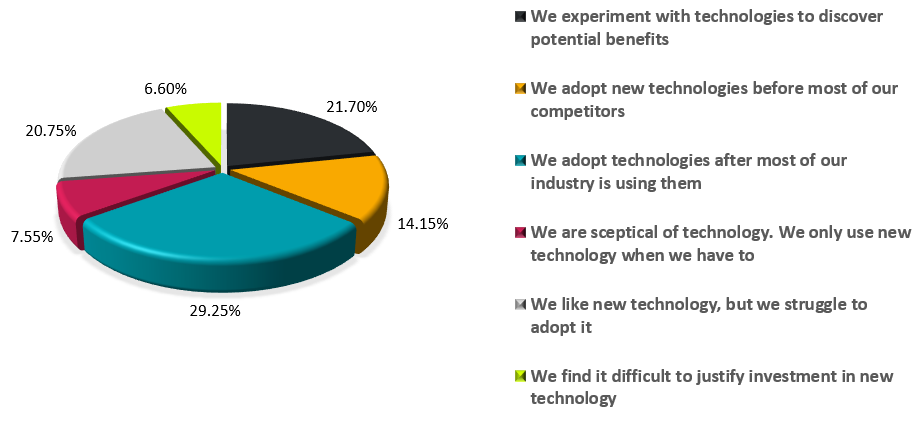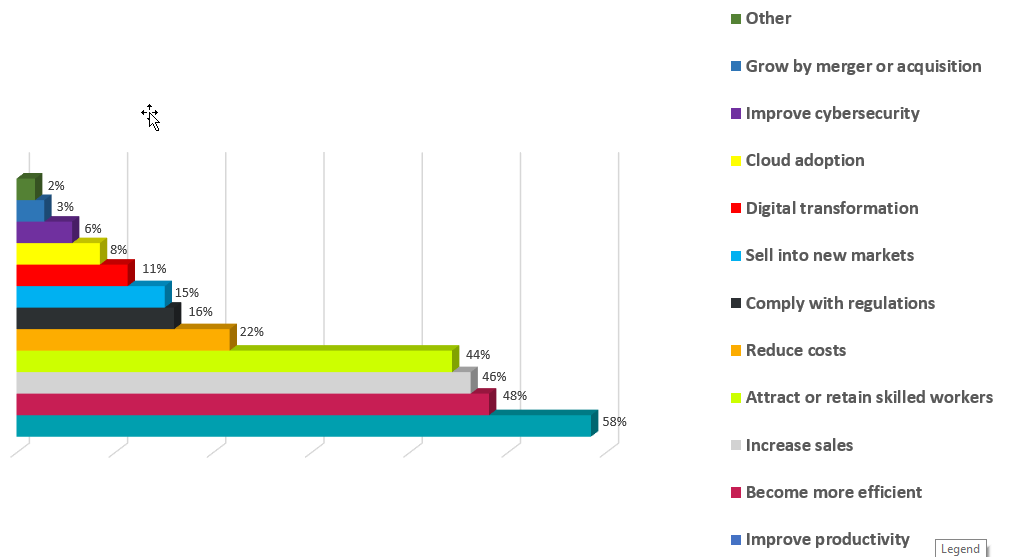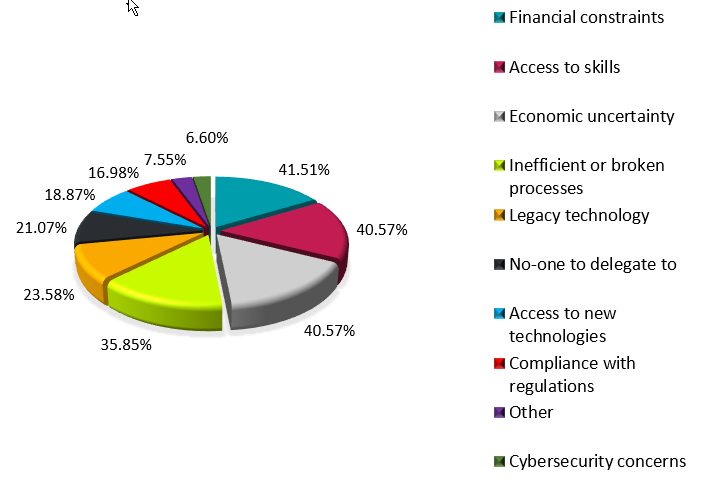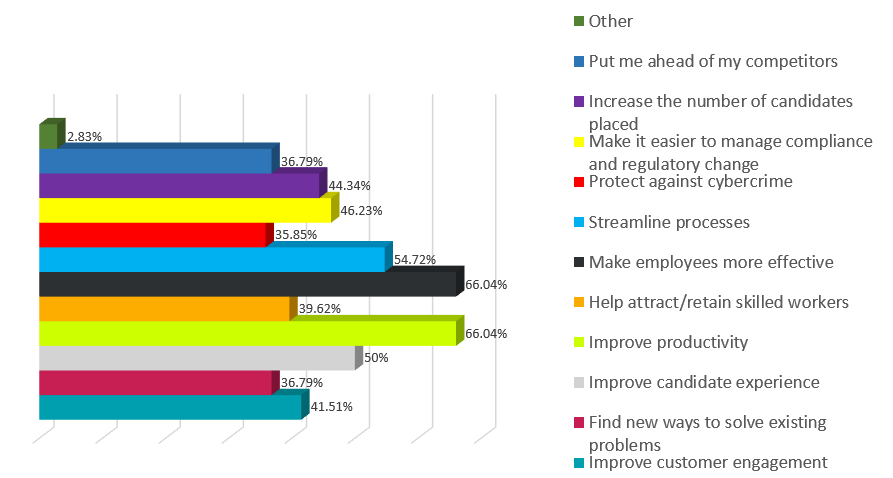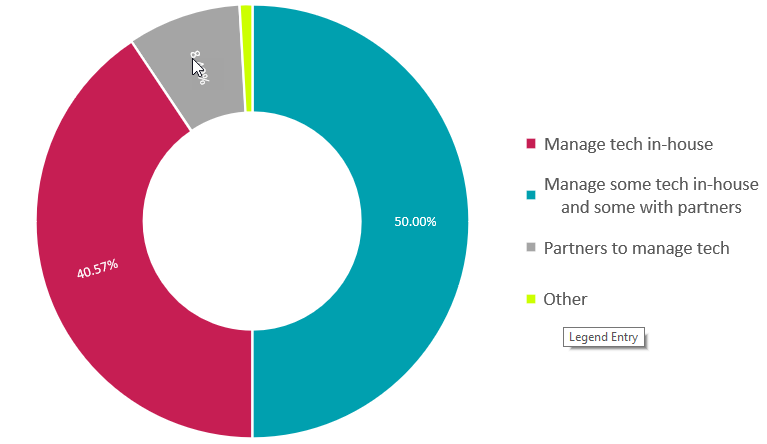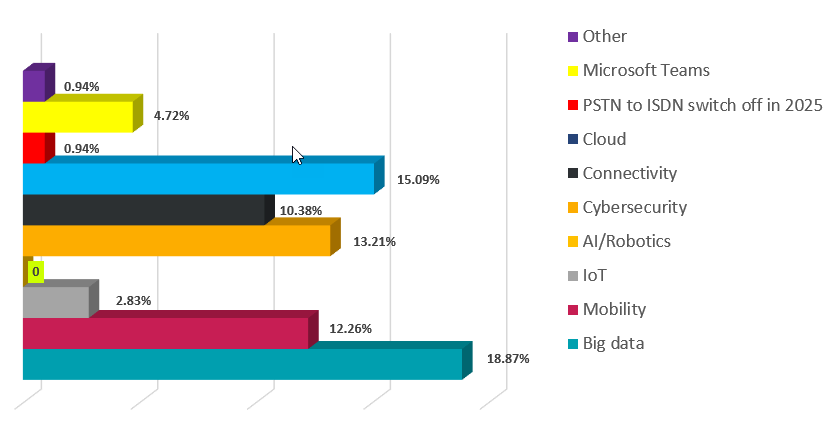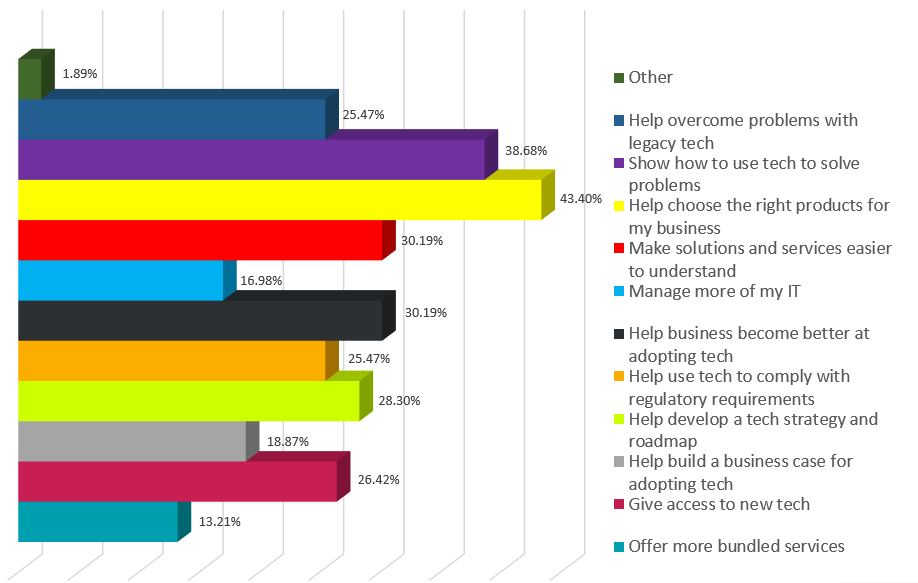Today’s fast-moving recruitment sector needs the right tech to get ahead. This is why Blue Saffron and the Association of Professional Staffing Companies (APSCo) developed a survey where over 100 recruitment C-suite professionals took part to help us understand what business leaders want technology to do for their companies.
We have gained insight into the top technology priorities for recruitment leaders in 2020 and beyond.
Executive Summary
As a business providing tech solutions to the recruitment sector for over 15 years, we have seen exceptional change take place in that time with many companies now realising what technologies can do for their business to accomplish their goals. That said, technology’s role is by no means clear cut and has evolved over the years just as much as the businesses themselves. Understanding the ongoing benefits and potential of tech is crucial if providers are to continue to thrive.
Building this understanding means not just looking at the current state of play in terms of tech, but also what businesses are trying to achieve. What are the top business priorities? How important is investing in tech to the future success? What they want their tech to do? Does cybersecurity still have the biggest impact or is AI taking over?
Answering these questions is about looking at the current landscape of the IT department. This summary will probe at the big challenges IT professionals are facing – such as skills shortages – as well as the presence of wider business leaders in the organisation’s digital development. This will shine a spotlight on exactly where organisations are in their technological evolution and define technology’s ongoing place more clearly within the IT ecosystem.
Methodology
In late 2019, Blue Saffron and ASPCo conducted a joint piece of research designed to gauge the latest opinions on technology and the challenges UK recruitment business face.
The research polled over 100 C-level executives in large enterprises and small to medium-sized business (SMEs), reflecting the opinion and vision of the most influential members of recruitment businesses. The results offer insight from people with the power to design a future involving technology that benefits their company. All of those represented have UK operations.
Summary of key findings
- More than 92% see technology as critical or important to the success of their business.
- Improving productivity and becoming more efficient topped the polls in what businesses top priorities are.
- Financial constraints, broken or inefficient processes, and legacy technology are the biggest challenges hampering further digitisation.
Results
When it comes to technology, which of the following statements best describes your organisation?
When asked about their tendency to adopt new technology, the majority of respondents said they wait until most of the industry is using new technology before they implement it.
Suhail Mirza, Blue Saffron’s Strategic Advisory Board Member, explained
“Recruiters are more and more reliant on productivity. Many want to experiment but wait for the early adopters before they go ahead. In today’s fast-moving environment where business models are changing rapidly, waiting is no longer an option that will allow businesses to thrive. Businesses who wait will die.”
Ronnie Lewis, Blue Saffron’s Co-Founder and Sales Lead, added:
“Using the technology adoption curve, mid-to late adopters will have the best experience with a managed service providers because they can share the learning form the innovators and early adopters by working with providers who’ve been through the process already with other companies.”
What are your top business priorities?
One of the most compelling results has come from what businesses are making their top priority. Both increased productivity and efficiency improvement topped the polls. Increasing productivity was defined as increasing output against total cost.
Almost 59% of companies want to improve productivity and more than 48% of companies want to become more efficient. Over 46% want to increase sales and over 44% want to make sure they can attract and retain skilled workers.
Suhail Mirza, Blue Saffron’s Strategic Advisory Board Member, explained the reasons behind the desire for better productivity:
“Productivity is an external market pressure because margins are continually being squeezed. The only way to grow your recruitment business is to cut costs or to increase productivity to give you more return for your investment. There are technology solutions across the board that can help, such as financial technology and candidate attraction capability using CRM systems.”
Ronnie Lewis, Blue Saffron’s Co-Founder and Sales Lead, added:
“Recruitment companies need to have systems that are always available. Slowdowns are the new down, because if a system is slow, it’s as bad as it not being available at all. Recruitment firms want to avoid this, and they also want to have technology that allows flexible and remote working, because this generates more productive hours.”
When it comes to doing your job, what gets in your way?
The survey asked recruitment leaders what their barriers to effective working practice are. More than 41% stated financial constraints as being their biggest barrier, nearly 36% blamed broken or inefficient processes, and almost 24% stated that legacy technology was a problem.
Ronnie Lewis explained this:
“Recruitment companies are fighting against budgets – they’re always trying to do more with less. They are sticking with their current, ineffective IT environment even though they know things could be a lot better because they need a compelling argument to commission new technology. They need a strong business case that requires strong financial reasoning and cost saving. But it’s not just about saving money, it’s about seeing more value from investment and getting more from their IT.”
Suhail added:
“It’s astounding that one in four respondents are saying that the big thing getting in their way is legacy technology. That’s where we can help.”
How important is technology to the future success of your business?
More than 92% revealed that technology is critical or important to the success of their business.
What do you want technology to do for your business?
Asking what recruitment leaders want technology to do for their business, the survey revealed that 66% want technology to help them make employees more efficient and improve productivity. More than 54% of leaders want technology to help them streamline processes, and 50% want it to help them improve the recruitment experience for both the client and the candidate.
Suhail explained:
“Recruiters want their technology to do everything. There are thousands of recruitment agencies out there, and clients need to seek out a swift, efficient and effective agency that can provide the best recruits for their business. Technology that helps recruiters fill roles more swiftly means clients will choose their agency over competitors.”
“There’s a bidding war for talent, and the best agencies with the best technology can be in a position to differentiate their brand and show that they can deliver exactly what the client wants to make their brand stand out.”
How do you want technology to fit into your business?
50% of recruitment leaders want to mix their IT provision by combining in-house solutions coupled with outsourcing some services to managed IT companies. Only 40% of recruitment companies want to manage all their own IT in-house themselves. It appears that outsourcing technology solutions is a priority for businesses, combining in-house resource with the expertise and reliable support of an outsourced team.
Suhail revealed the reason behind this:
“Fewer recruitment companies want to manage all their own IT in-house. This is a trend because recruiters want to deliver more for less. In the recruitment world, the core activity is sourcing and matching talent to meet the clients’ requirements. This stat shows the recognition that the key to success is allowing clients to focus on their core talents. Only a minority of recruitment companies do all their IT in house.”
“Recruitment leaders have realised that outsourcing converts fixed IT costs into variable costs, allowing them to implement new IT quickly and allowing them to budget effectively. Working with specialists strengthens a recruitment company by helping them to provide a better experience to customers and candidates. IT is shifting from being a ‘cost centre’ to a function that sits at the interface of core operations and adds capital value.”
Ronnie added:
“The limitations of an individual are being recognised – agencies with IT teams of one, two or three people are limited to the skills those people have. These small teams may be overworked or may not have been able to undertake training. By outsourcing IT with a managed provider, agencies can access an abundance of talent.”
Which of the following technologies will have the biggest impact on your organisation over the next three years?
When it comes to new technology advancements impacting the recruitment industry, 20% of recruitment leaders felt that artificial intelligence and robotics would affect them in the next three years, by allowing automation that would improve productivity.
Neal Robinson, Blue Saffrons’ Co-Founder and Managing Director told us:
“This is because robotics are already making significant gains for recruitment companies, allowing them to have more traction more quickly. This is often quicker and easier to implement than artificial intelligence, as some of the promises of early AI are not yet delivering practical solutions.”
Leaders also highlighted better customer data management software and cyber security as high-impact technologies.
Suhail added:
“Robotics is a long way away, but recruiters are interested in the automation of logarithmic processes of recruiting work. Sourcing and matching candidates using automation would allow recruiters to focus on the qualitative work.
“Big data is also important for larger providers – big recruiters such as healthcare organisations are using big data to look at trends to help them with mass recruitment. Recruiters are looking for the next big trend that they will be able to provide talent into, such as cyber security, so they are looking at and understanding big data to predict and make the most of future opportunities.”
Ronnie concluded:
“Larger firms have separated AI from robotics. When they talk about bots they’re talking about back office processes that are repetitive. These processes can be automated and the bigger firms are putting a lot of investment into this. This will filter down to the smaller players in time. As for big data, macro trends are identifying niche areas where big data can be used to analyse and improve processes to increase productivity by identifying bottlenecks and make improvements.”
What is the most useful thing a supplier of IT, Telecoms and Cloud Services could do to help your business?
Asked what the most useful thing that a managed IT service provider could do for their business, recruitment leaders felt that helping them to choose the right products for their business and showing them how to use technology to solve problems were where they could use the most help. This is because technology is changing quickly. It’s becoming harder to procure the right solution without specialist help.
Ronnie told us:
“These results show exactly what we see in the recruitment industry – that recruiters want to get help that will help them protect their business.”
“The world of tech is also wrapped up in lot of jargon – many solutions look the same on the surface but have important differences when you look into the detail. Managed IT providers can help recruitment firms cut through the confusion and find the products that are right for them.”
Suhail added:
“There’s a bewildering amount of tech available, from onboarding to background searching and more. Recruitment companies are looking for a provider to help them traverse this minefield – they want to know what’s good, how they can adopt it and how they can manage its implementation.”
Ronnie agreed:
“Recruitment firms trust advisors to help navigate the landscape to identify products that will make a difference and avoid vanity projects. They also want help with project management for implementation. Adoption can be low for new technology if new tech isn’t well explained, well implemented and embedded into recruitment firms.”
Suhail added:
“There have been well known cases of recruitment firms failing to develop their own tech in-house. Some firms have spent hundreds of thousands of pounds trying to implement their own tech in-house and it’s gone very wrong and run significantly over budget.”
Ronnie agreed:
“Creating a heavily home-grown infrastructure can have devastating effects.”
Which tech services will your business buy over the next 12 months?
Out of the leaders surveyed, almost 35% were planning to buy CRM systems in 2020, 31% were expecting to need to buy security services and 29% planned to purchase cloud and hosting technology. These elements are closely linked because the new CRM systems are cloud based and need to be secure.
Suhail made a clear point:
“Tech is no longer a peripheral service of product – it’s a fundamentally strategic decision for the business. This is how it should be used – as a central part of business strategy and how businesses differentiate themselves– how they survive. Choosing to purchase essential new technology isn’t a cost- focused decision.”
Conclusion
The survey shows that recruitment leaders have a clear understanding of what they want and need from their business technology, now and in the future. It has provided a useful insight into the expectations and needs of recruitment leaders and has revealed that increased productivity is at the heart of technology expectations.
Biographies
Our co-founder and Managing Director Neal has spent over 25 years in international technology development and business growth. More
Our co-founder Ronnie is key to new business acquisition and leads on account development and has a wealth of experience in operations and sales within the technology sector. More

Based in London, UK, Mirza is a former practicing solicitor, a business owner and successful author who specialises in helping investor backed businesses in the healthcare, recruitment and support services sectors achieve rapid growth and market share.
Case Studies
Be more productive with
brilliantly managed IT
TALK TO US | 0844 560 0202
CONTACT US

